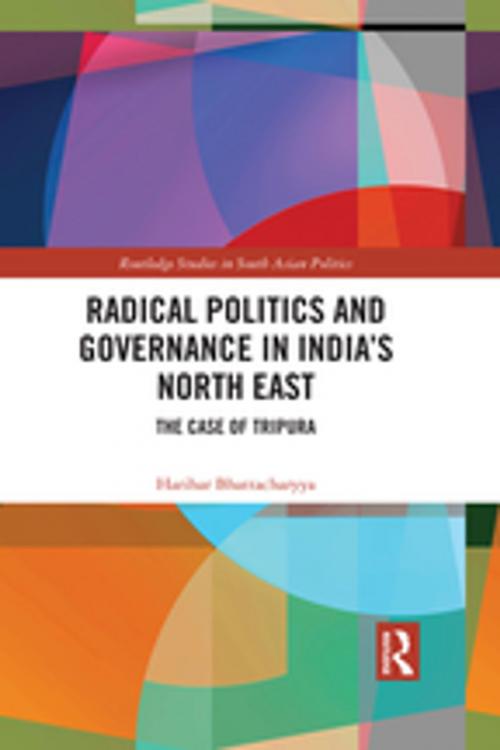Radical Politics and Governance in India's North East
The Case of Tripura
Nonfiction, Social & Cultural Studies, Social Science, Cultural Studies, Ethnic Studies, Political Science| Author: | Harihar Bhattacharyya | ISBN: | 9781317211167 |
| Publisher: | Taylor and Francis | Publication: | March 9, 2018 |
| Imprint: | Routledge | Language: | English |
| Author: | Harihar Bhattacharyya |
| ISBN: | 9781317211167 |
| Publisher: | Taylor and Francis |
| Publication: | March 9, 2018 |
| Imprint: | Routledge |
| Language: | English |
Tripura in India’s Northeast remains the only region in the world which has sustained a strong left radical political tradition for more than a century, in a context not usually congenial for left politics. Tripura is one of the 29 States in India which has returned the Communist Party of India (Marxist) led Left Front repeatedly to power. By contrast, radical ethnic politics dot the political scenario in the rest of the region.
This book examines the roots, nature, governmental performance, and theoretical and policy implications of left radicalism in Tripura. The case of Tripura is placed in comparison with her neighbours in the region, and in some cases with India’s advanced States in governance matters. Based on original archival and the very recent empirical and documentary sources on the subject, the author shows that the Left in Tripura is well-entrenched, and that it has sustained itself compared to other parts of India, despite deeply rooted ethnic tensions between the aboriginal peoples (tribes) and immigrant Bengalis. The book explains how the Left sustains itself in the social and economic contexts of persistent ethnic conflicts, which are, rarely, if ever, punctuated by incipient class conflicts in a predominantly rural society in Tripura. It argues that shorn of the Indian Marxism’s ‘theoretical’ shibboleths, the Left in Tripura, which is part of the Indian Left, has learned to accommodate non-class tribal ethnicity within their own discourse and practices of government. This study demolishes the so-called ‘durable disorder’ hypothesis in the existing knowledge on India’s Northeast.
A useful contribution to the study of radical left politics in India in general and state politics in particular, this book will be of interest to researchers of modern Indian history, India’s Northeast, and South Asian Politics.
Tripura in India’s Northeast remains the only region in the world which has sustained a strong left radical political tradition for more than a century, in a context not usually congenial for left politics. Tripura is one of the 29 States in India which has returned the Communist Party of India (Marxist) led Left Front repeatedly to power. By contrast, radical ethnic politics dot the political scenario in the rest of the region.
This book examines the roots, nature, governmental performance, and theoretical and policy implications of left radicalism in Tripura. The case of Tripura is placed in comparison with her neighbours in the region, and in some cases with India’s advanced States in governance matters. Based on original archival and the very recent empirical and documentary sources on the subject, the author shows that the Left in Tripura is well-entrenched, and that it has sustained itself compared to other parts of India, despite deeply rooted ethnic tensions between the aboriginal peoples (tribes) and immigrant Bengalis. The book explains how the Left sustains itself in the social and economic contexts of persistent ethnic conflicts, which are, rarely, if ever, punctuated by incipient class conflicts in a predominantly rural society in Tripura. It argues that shorn of the Indian Marxism’s ‘theoretical’ shibboleths, the Left in Tripura, which is part of the Indian Left, has learned to accommodate non-class tribal ethnicity within their own discourse and practices of government. This study demolishes the so-called ‘durable disorder’ hypothesis in the existing knowledge on India’s Northeast.
A useful contribution to the study of radical left politics in India in general and state politics in particular, this book will be of interest to researchers of modern Indian history, India’s Northeast, and South Asian Politics.















